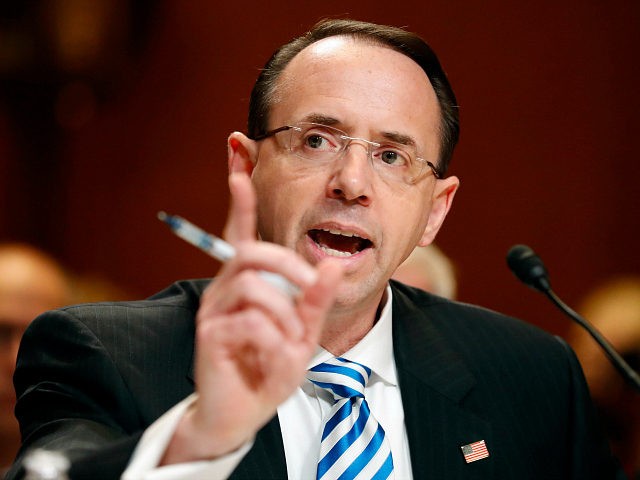ABC News reported Friday that Deputy Attorney General Rod Rosenstein, who appointed Robert Mueller as special counsel for the Russia investigation last month, may be considering recusing himself from that investigation.
According to ABC, “sources” stated that Rosenstein, the number two man at the Department of Justice, “has privately acknowledged to colleagues that he may have to recuse himself from the matter.”
The DOJ, however, insisted the deputy attorney general’s stance on recusal remains the same. “As the Deputy Attorney General has said numerous times, if there comes a point when he needs to recuse, he will. However, nothing has changed,” DOJ Spokesman Ian Prior told Breitbart News.
Rosenstein came to be the top law enforcement official with regard to the investigation into Russian interference in the 2016 elections after he was sworn in in April. In March, Attorney General Jeff Sessions himself had recused himself based on his being involved in the Trump presidential campaign.
Following the leak of ex-FBI Director James Comey’s now-infamous “let this go” memo, supposedly based on a conversation between President Donald Trump and himself, in May, Rosenstein made the decision to appoint Mueller as special counsel for the investigation.
Under oath before Senate Intelligence Committee, Comey admitted he himself leaked the memo to the press through friend and Columbia University law professor Daniel Richman with the specific purpose of forcing Rosenstein’s hand to make that appointment. Mueller was Comey’s predecessor as head of the FBI and a friend and mentor of his.
Questions have been raised about the future of Mueller’s role, especially given his appointment of several attorneys who have either represented the Clinton Foundation in the past or were themselves donors to the Hillary Clinton campaign for president to serve beneath him in the investigation.
The prospect of Rosenstein’s recusal comes amid reports the rapidly expanding special counsel investigation is shifting away from alleged collusion between Russian officials and the Trump campaign and towards allegations of obstruction of justice by the president. President Trump has vigorously objected to the propriety of such an investigation.
Presumably, a probe into possible obstruction would involve investigating the Comey’s firing in May. Rosenstein himself wrote the memorandum on which Trump ostensibly made that decision, calling for Comey’s dismissal based on his handling of the Clinton email server scandal.
His involvement in the firing has lead to speculation Rosenstein may need to act as a witness for Mueller’s investigation. Asked about the prospect and his potential need to recuse during his testimony before the Senate Appropriations Committee, Rosenstein said only, “I am working with career professionals who know these rules and are responsible for enforcing these rules, and I can assure you that we’re going to do the right thing, and we’re going to defend the integrity of that investigation.”
The same ABC report cited sources claiming Rosenstein has not, as of yet, formally asked DOJ ethics attorneys for advice on recusal.
A growing group of law professors, however, have joined the president in questioning Mueller’s decision to look into obstruction over the matter. Harvard Law School professor emeritus Alan Dershowitz has told media outlets several times that he does not think a case for obstruction is possible given the facts, as has Florida International University College of Law’s Elizabeth Price Foley.
Randy Barnett, Georgetown University Law Center’s Carmack Waterhouse Professor of Legal Theory, called on Mueller to resign over his own ties to Comey, also a subject of the investigation, in a series of tweets Thursday:
https://twitter.com/RandyEBarnett/status/875325990288883714
https://twitter.com/RandyEBarnett/status/875326421333405697
Should the deputy attorney general choose to recuse himself, ultimate authority for the Russia investigation would fall to DOJ’s number three, Associate Attorney General Rachel Brand.

COMMENTS
Please let us know if you're having issues with commenting.